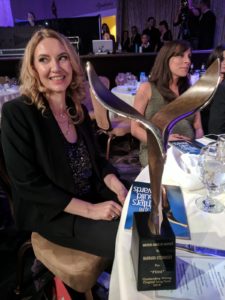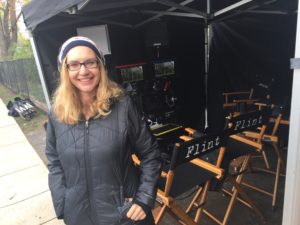AFIC WDA celebrates member Barbara Stepansky, who sat down with us to talk about her recent project, FLINT, starring Queen Latifah for which she won the 2018 WGA Award for Best Long Form Original.

How did you come to this project?
Storyline Entertainment had picked up the rights to the Time article “The Toxic Tap” by Josh Sanborn and was looking for a writer to adapt his research on the Flint Water Crisis into a TV Movie script that Lifetime was already attached to, because they liked the basic concept. My agent had sent them a couple of my work samples and after they looked through everything, I had a first interview to see if we were on the same page story-wise. Sony and Lifetime had already approved me as a potential writer based on those samples.
How did you prepare for that interview with producers? How do think your ideas stood out? Or as you mentioned above, was your prior work more impacting for them in hiring you?
I had obviously done my research and I knew all the players involved in the crisis, so I could speak intelligently on the topic. In my case, my prior work had impacted them already but it was still important to establish a tone and flow to the script that the producers could agree on. I’m a huge fan of “And the Band Played On”, which does such a terrific job of weaving various storylines together in a dramatic way, so that was something I heavily wanted to emulate.
Was this your first experience pursuing a writing project for TV?
I had written TV pilots before but this was my first experience with a TV Movie seven act structure.
Working from Josh Sanburn’s article, how did you discover the way you wanted to tell the story?
After reading Josh’s article, I had a billion questions. He was available to me as a source so we spent some time on Skype and on the phone. I did more research on the water crisis, learned the time line and read interviews. Then I started communicating with the Flint activists and residents that Josh had access to. I was able to widen that net when I travelled to Flint and found as many perspectives as I could on the subject. Curt Guyette from the ACLU, who had initially broken the story in the media, was extremely helpful as well. From the get-go I felt that I had to focus on the human angle and the residents’ perspective to tell the most honest account. There was no way I could fully cover the amount of red tape and politics involved without making my own assumptions that simply weren’t backed up by tangible proof. When I started researching, the water crisis wasn’t over, and ironically it still isn’t. In the background of the Flint residents’ continuous suffering was a very nebulous story of people in charge passing the buck. I hope that this still comes across in the script, but it had to all be from the point of view of the residents who had to deal with a health risk in their homes and weren’t being heard. There was no one “Erin Brockovich type hero” that stood out so I decided to focus on three or four women that had very early on rung alarm bells, most of whom I had talked to. I focussed the story on the beginning of the crisis April 2014 and decided to end it in October 2015 when these self-made activists achieved their first success – making national news with their citizen-run water study and having the city switch back to Lake Huron water. Once that was decided it was all about weaving the beats into the plot, which meant that sometimes I had to take some creative license with the events on the time line but not too much. I needed to stay true to what had happened after all.
Describe your experience working with the network and the producers of Flint and how you dealt with challenges. What was the process like to reach the final draft? How did you handle their notes?
I honestly had the best development experience with producers and network. My first outline was extremely long, a bit over forty pages, packed with characters, science, politics, adhering all too closely to the original timeline – so rather than giving me detailed notes, everyone more or less had to trust that it was all going to make sense once I dove into the draft. The first draft still had a lot of details on corrosion control and plumbing, so it probably read a bit like a science paper. The biggest note was to keep chipping away at the human factor and the relationships between the residents. I felt strongly that I didn’t want to artificially create conflict between the water warriors even though of course they had differing opinions. It slowly became a story of how people had to band together in order to make change happen.
What was your experience writing under the pressure of a network deadline? How do you deal with writer’s block under that pressure?
I honestly don’t know how to work without deadlines. That’s what I grew up with and continued throughout all of my college years. Film school was particularly harsh with deadlines that couldn’t be moved or extended. Working under contract is therefore just a continuation of the education I had already received. When I write a spec, I even ask my manager to give me artificial deadlines. In terms of dealing with writer’s block, sure there are always good days and bad days but a few years ago I decided that writer’s block doesn’t apply to me anymore. That it doesn’t exist as long as I show up. So I would sit down at my desk every day and write five pages, come what may. I got really disciplined that way. I adjust that page-count-schedule if I’m doing rewrites or outlines. What creates pressure is a last minute rush. If you’ve arranged your schedule well, that doesn’t become an issue.
How much time did you have in total to complete the script?
I believe it was around 6-8 weeks.
Page count on the final draft?
96. My first draft had come in at 117.
Personally, how do you feel this experience impacted your own writing process – did you have any Ah-Ha moments to take away?
I definitely learned a lot about the process of putting an ensemble-cast movie together and how to keep every character in the game. Once the director came on board, I felt the script did another big jump forward dramatically. Bruce pushed me to make everything interesting rather than intellectual, and made me pull a lot of conflict into the first half. I fought a lot of those timeline changes but ultimately I realized he was right and we found great compromises. I think the biggest ah-ha moment I had was that I walked into Flint with very wrong preconceptions. I expected people to be downtrodden but they were all just angry at not being heard. I hope I captured that anger adequately, I was sure we could all relate to it.

Since you are a director yourself, how was it collaborating with another director?
I’ve collaborated with a director before on projects so it wasn’t a huge adjustment. You just have to very early on disconnect from that part of your brain. In the case of “Flint” I felt it was valuable to have another perspective because it was such dense material. I may have overlooked something because I’m too close to the research. I actually never use my directing perspective in writing, not even for specs that I do write for myself to direct. It’s just not something I believe is interesting to read. Instead of writing “ECU push-in on Tina’s eyes”, which sounds dry and boring, you write “Tina’s eyes widen in sheer horror” and everyone gets it and can interpret that however they please, but feels much more emotionally connected to the material.
What’s the best advice you would give writer/directors who are interested in creating TV content?
Best advice is probably to keep creating content, whichever way possible. If you’re interested in working in TV, all producers will tell you that what they most care about is characters. Compelling characters we love to watch is what we tune back for. They drive the plot. TV directing without controlling the creative content is a bit of a different animal and I don’t think there’s no one set way to get those gigs. You have to keep knocking on those doors and prove yourself over and over again.
Was writing this project complimentary to your career path as a director?
I think if you can work above the line in any capacity, be it as a writer or producer, and do well at it, it helps your path as a director. Developing a trust in your taste and ability to collaborate is a big deal and you can build on those relationships for the future.
Was directing Flint or any future project with this network or producers ever part of negotiations?
Not really. I was always aware that once the script was in a good place, it would go out to notable directors the producers have worked with before. I suppose that’s the usual Catch 22 you’re up against – but you gotta start somewhere.
Without getting into specific numbers, how was your writing deal structured? Did it include number of drafts or rewrites or time available?
It was a standard one-off deal, which includes outline, first draft, two revisions and a polish. At the time I was an unproven entity so there wasn’t all that much room for negotiation but I had an agent and a lawyer making sure that all the i-s were dotted.
Any advice for our directors in securing representation, as well as a lawyer? And what should they keep in mind when forming these relationships?
I wish I had some solid advice but I met my first lawyer while hanging out at a very crowded small bar in Park City during the Sundance Film Festival. I handed him my AFI thesis film as I was carrying around DVDs everywhere. And he actually called me a week later and wanted to represent me. You just never know where that connection will come from and who your work connects with. Just keep putting yourself out there. I wasn’t represented as a director by an agent or manager for years and yet I was working. I think that’s possible for a director, not so much for a writer. Once I had specs that were doing well in the screenwriting competitions, it was fantastic to have reps come on board and help you get those scripts into the right hands. Having a rep team is great but you can also garner a strong creative team through producers and your daily collaborators. For me it’s definitely a truism that you need to find your tribe, keep working, and an agent will find you.
What’s next?
Wherever the wind takes me!
Photo Credit: Barbara Stepansky. Interviewed By Sheena McCann.

